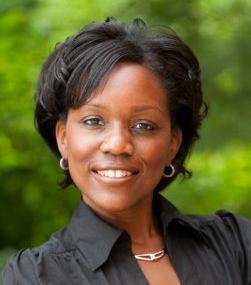Dr. Trachette Jackson, a CSBC investigator at the University of Michigan, uses data-driven mathematical modeling to identify the best cancer treatment strategies to translate into the clinic.
During her undergraduate training in math, she heard a talk about mathematical biology by a pioneer in the field. This lecture helped her realize that she wanted to pursue a career combining math and the life sciences.
This led her to graduate school in applied math where she started to venture into mathematical oncology. During one of her courses, she ended up meeting some chemists who worked at Bristol Myers Squibb on drug targeting and cancer. They became her mentors and experimental collaborators as she started developing mathematical models to figure out the best ways to deliver cancer drugs for her dissertation.
Now, as a professor and researcher, she constructs models using differential equations to improve the dosing schedule of combination cancer treatments.
In this interview, Dr. Jackson discusses some of her outreach activities to train the next generation of scientists, shares her views on mathematical oncology, and describes her CSBC research.
Could you discuss some of your outreach activities related to your career experiences?
When I was in high school, I was able to go to a college campus to take undergraduate math classes, which was a great experience. To pass this on to the next generation, each year for the last ~20 years, I've run an intensive 2-week math and biology course for high school students.
This course, part of the Michigan Math & Science Scholars program, allows students from all over the world to get hands-on experience with math and models from a variety of biological disciplines. It helps students learn about team-based science, allows them to meet people who work in interdisciplinary fields, and gets them thinking about science careers, including those related to mathematical modeling and mathematical biology.
Another outreach program that I am involved in is aimed at 1st and 2nd year college students. This project is driven by the fact that we really need more diverse students to become leaders in science, technology, engineering, and mathematics (STEM).
A challenge is that more than half the students that enter college wanting to major in STEM don't end up getting that STEM degree. There's a high attrition rate and the biggest drop off happens to be students of color and students from underserved backgrounds. When I was researching and finding out all these facts, it really made me want to figure out ways to support students and address this retention in STEM problem.
I became the faculty director of a program focused on increasing STEM retention, which is called the Michigan Science Academy or just M-Sci. We provide a holistic, co-curricular support system for these students, and it's been instrumental in helping them successfully complete their STEM degrees. We've had 13 cohorts of about 25 to 50 students from very diverse backgrounds. I’m proud of this program because it’s making a difference in helping students accomplish their goals in STEM.
Finally, I want to talk about the Marjorie Lee Browne Scholars Program that I started in 2011. The initial goal of this program was to encourage more undergraduates to pursue doctoral degrees in mathematics and applied mathematics by using the master’s degree as a stepping-stone to the Ph.D.
Over the past decade, we've had 10 cohorts with very high completion rates and our graduates are going on to Ph.D. programs. We already have five students who have earned Ph.D. degrees and two more who are going to earn their doctorates in 2021. Not only have we been able to increase the diversity in my own department, but we have produced these well-trained mathematicians who are going off and being successful in other Ph.D. programs. Eventually, they are going to change the face of the professorial.
Why do you think it’s important to apply mathematical approaches to cancer biology?
I think that medical oncology could really use a mathematical modeling toolbox that can leverage clinical measurements to optimize treatments for individual patients. Mathematical modeling can also help us make predictions to improve clinical care.
For example, you might first want to predict which drug or combination of drugs will work best on particular patients, and then it becomes important to know the right dose and schedule for administering that drug. Mathematical modeling can help answer these types of questions.
Can you describe your CSBC project?
The main goal is to use mathematical modeling to optimize the combination of immunotherapy with other treatments that target promoters of bladder cancer growth.
We're also exploring two different ways (one slower and one faster) that immune cells kill tumor cells. Our hypothesis is that the relative proportion of slow and fast immune cell killing in tumors is modified by different therapies.
To investigate our hypothesis, we're developing a multi-scale mathematical model using data from biological experiments. My collaborators are using high-throughput cell imaging to see how immune cells and bladder cancer cells behave on their own and how the immune cells kill the cancer cells. Putting this information into the model, we can then run computer simulations to figure out the best way to deliver the combination treatment.
By integrating computational modeling along with experiments, we can shed some light on the immune cell killing mechanisms in bladder tumors. It will also help us answer translational questions about how to administer combination therapy to maximize tumor response. Ultimately, this can help to select the best possible drugs for clinical trials.
